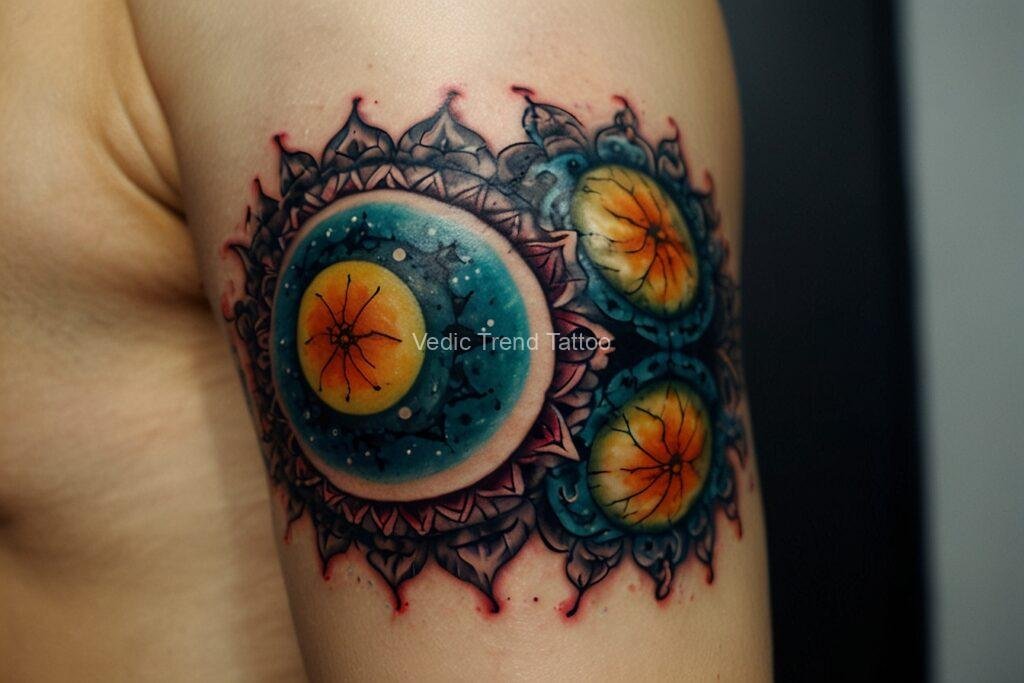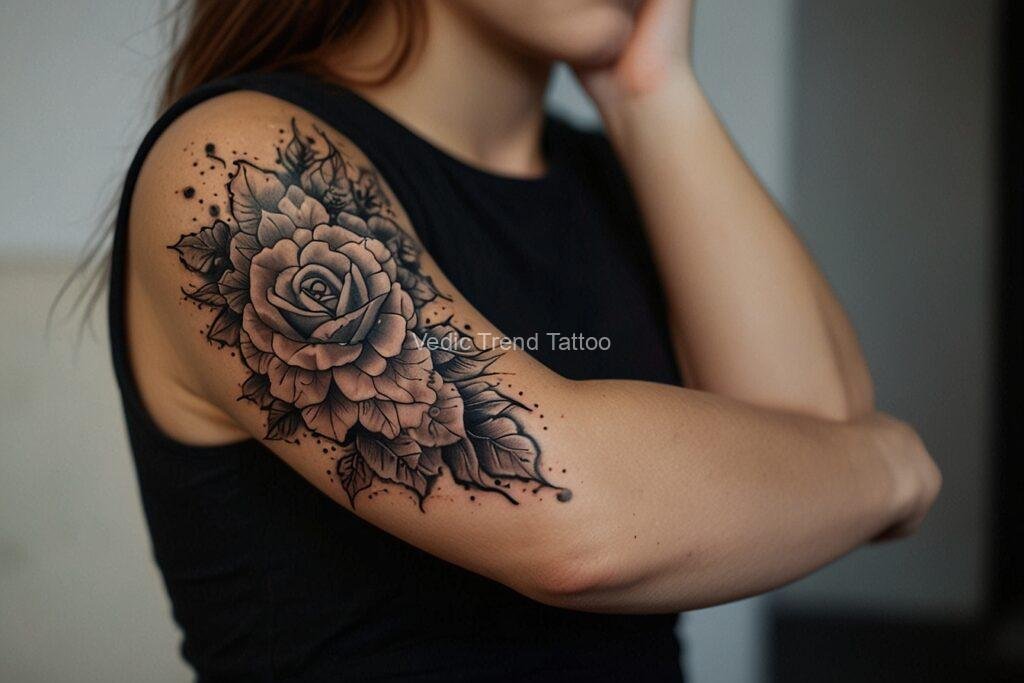Thinking about getting a tattoo while on Dupixent? This article will help you understand what you need to know. Dupixent is a drug used to treat certain conditions. It’s important to consider how it might affect your skin and healing. We’ll cover potential risks and aftercare tips. You need to talk to your doctor before getting inked.
Key Takeaways
- Consult your dermatologist before getting a tattoo. This is especially important if you are on Dupixent.
- Be aware of the risks. They include allergies and slower healing.
- Proper aftercare is crucial to avoid complications.
- Tell your doctor about your full medical history. Also, tell them about your current medications.
- Consider temporary or alternative body art. Do so if you’re worried about a permanent tattoo.

Understanding Dupixent and Its Uses
What is Dupixent?
Dupixent is a prescription medicine. It is used to treat many chronic conditions. Doctors often prescribe it for people aged 6 years and older. They have moderate-to-severe atopic dermatitis. It is also known as eczema. You can use this medication with or without steroids. Dupixent is also used to treat other conditions. These conditions include asthma. They also include chronic rhinosinusitis. It comes with nasal polyps.
Common Conditions Treated with Dupixent
Dupixent is for many conditions. These include:
- Moderate-to-severe eczema (atopic dermatitis)
- Moderate-to-severe asthma
- Chronic rhinosinusitis with nasal polyposis
- Eosinophilic esophagitis
- Prurigo nodularis
How Dupixent Works
Dupixent works by targeting proteins in the body. These proteins cause inflammation. Blocking these proteins reduces the symptoms. It treats the conditions. This can lead to clearer skin. It also means easier breathing. It means better life for those with these conditions.
It’s important to ask your healthcare provider. They can explain. They can tell you how Dupixent can help your condition.
Tattoo Considerations While on Dupixent
Potential Risks
When considering a tattoo while on Dupixent, be aware of the risks. Dupixent can affect your immune system. This might change how your body responds. It will change how it responds to the tattooing process. This could lead to a higher chance of infections or slower healing times.
Consulting Your Dermatologist
Before you get a tattoo, you must talk to your skin doctor. They can give personalized advice. It’s based on your medical history. It’s also based on your current treatment plan. Your dermatologist might suggest waiting. Wait until you finish your treatment. They might also suggest taking extra care to minimize risks.
Tattoo Aftercare
Proper aftercare is vital. This is especially true when on Dupixent. Follow your tattoo artist’s instructions carefully. Keep the tattooed area clean and moisturized. Avoid putting the tattoo in direct sunlight. Also, avoid swimming in pools or hot tubs until it is fully healed.
Always prioritize your health. Ask your doctor before choices. They could affect your treatment.
Allergic Reactions and Dupixent
Signs of Allergic Reactions
Dupixent use can cause serious allergic reactions. Look out for symptoms. These include trouble breathing. They also include swelling of the face or throat. They also include dizziness and a fast pulse. Other signs include hives. You may also have fever and swollen lymph nodes. If you notice any of these, stop using Dupixent. Seek medical help right away.
Managing Allergic Reactions
If you have an allergic reaction, you must act fast. First, stop using Dupixent. Then, contact your doctor. Or, go to the emergency room. They might give you medications. The drugs will help manage the symptoms and stop them from getting worse.
When to Seek Medical Help
You should get medical help right away. This is if you have trouble breathing, feel faint, or see swelling in your face or throat. These could be signs. They could show a life-threatening reaction. Don’t wait—getting help fast can make a big difference.
It’s important to know the signs of an allergic reaction and act quickly. Your health and safety come first.
Impact of Dupixent on Skin Healing
Healing Process
When you get a tattoo, your skin needs time to heal. Dupixent can affect this healing process. It is important to understand how your body might react. This is if you are using this medication. Dupixent improves skin conditions like eczema. But, it can also change how your skin heals after getting a tattoo.
Possible Complications
Using Dupixent might cause complications. These happen during healing. These can include:
- Slower healing time
- Increased risk of infection
- More noticeable scarring
You must watch your tattoo. Follow all aftercare instructions closely.
Tips for Faster Recovery
To help your skin heal faster while on Dupixent, consider these tips:
- Keep the tattoo clean and moisturized.
- Avoid scratching or picking at the tattoo.
- Follow your dermatologist’s advice on skincare products.
- Stay hydrated and maintain a healthy diet.
Always ask your doctor before getting a tattoo. Do this while using Dupixent. They can give you personalized advice to ensure the best outcome.

Precautions Before Getting a Tattoo
Medical History Review
Before you get a tattoo, review your medical history. Conditions like eczema, psoriasis, or a tendency to keloids can harm your tattoo. If you have any of these conditions, talk about them with your doctor.
Discussing Medications with Your Doctor
Talk to your doctor about any medications you are taking. Some drugs, like anticoagulants, can increase bleeding. Your doctor can provide guidance on whether it’s safe to proceed.
Timing Your Tattoo Appointment
For most people, the safest approach is to wait. They should wait. They should wait. Their skin conditions must be well-managed. Ideally, the skin should be free of flare-ups for at least a few months. This helps healing. It also lowers the risk of problems.
Prepare your skin before the tattoo session. Keep it well-hydrated. This can make a big difference. Avoid getting a tattoo if your skin condition is active.
Tell your tattoo artist beforehand. Tell them if you have any allergies. This is especially important for disinfectants. It’s also important for creams. This helps avoid contact allergies. It happens during the healing phase.
Alternative Options to Tattoos
Temporary Tattoos
If you’re hesitant about a permanent tattoo, temporary tattoos are a good option. They can last up to two weeks and come in various designs. Brands like Inkbox offer beautiful designs. They are made by real artists. This way, you can enjoy the look of a tattoo without the long-term commitment.
Henna Designs
Henna is another popular option. It’s a natural dye that stains the skin for a few weeks. Henna designs are often intricate and can be a fun way to experiment with body art. Plus, it’s a painless process and can be done at home or by a professional.
Other Body Art Forms
If you do not like temporary tattoos or henna, there are other forms of body art to consider:
- Body painting: This can be a fun and creative way to express yourself, and it washes off easily.
- Decals and stickers are easy to apply and remove. They are perfect for short-term use.
- Jewelry and accessories can be as impactful as a tattoo. Sometimes, a well-placed piece of jewelry has the same impact.
Exploring these options can be a great way to enjoy body art. They lack the permanence of a tattoo.
You can choose temporary tattoos, henna, or another body art. You can express yourself in many creative ways. You can do so without getting permanent ink.
Communicating with Your Healthcare Provider
When you talk to your healthcare provider, be sure to mention all the medicines you use. These include prescription drugs and over-the-counter remedies. They also include vitamins and herbal supplements. Your healthcare provider needs to see the full list. It has all of your medications. This is key for your safety and well-being. Also, your insurance company will work with your doctor. They will gather any extra medical details needed. This process may seem long. But, stay patient through it.
Conclusion
You can get a tattoo while using Dupixent. But, it needs careful planning. You must consult with your doctor. Always tell your healthcare provider about your plan to get a tattoo. Discuss any possible risks. Remember, everyone’s body reacts differently. So, what works for one person might not work for another. Stay informed. Ask questions. Make the best choice for your health. Your safety should always come first.
Frequently Asked Questions
Can I get a tattoo while using Dupixent?
You should talk to your skin doctor. Do this before getting a tattoo. This is especially important if you are on Dupixent. They can help you understand the risks and guide you on the best way to proceed.
What should I tell my doctor before starting Dupixent?
You should tell your doctor about all your health issues. Also, tell them about any medications you are taking. This includes eye problems and parasitic infections. It also includes if you are scheduled to get any shots.
Are there foods I need to avoid while taking Dupixent?
You don’t need to change your diet while taking Dupixent. If you have questions about some foods, ask your doctor.
Can I drink alcohol while on Dupixent?
You should talk to your doctor about drinking. Do this while taking Dupixent to make sure it’s safe for you.
What are the signs of an allergic reaction to Dupixent?
Signs of an allergic reaction include rash. You may also have itching and swelling. They also cause dizziness and trouble breathing. If you have any of these, get medical help now.
How do I store Dupixent?
Store Dupixent in the fridge. Keep it in its carton to protect it from light. Do not freeze it.
